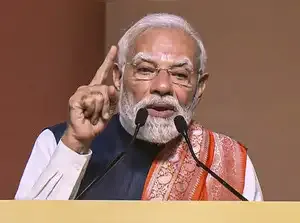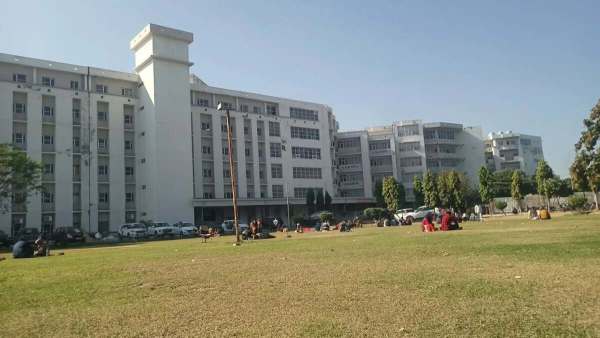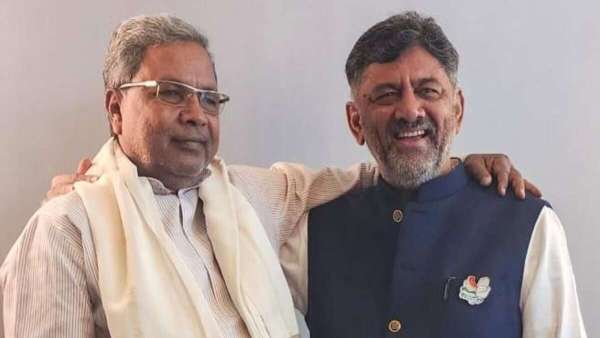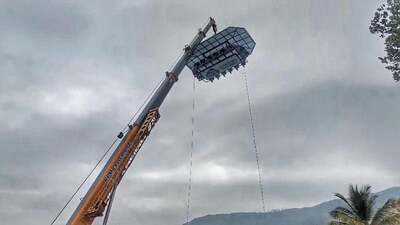Prime Minister Narendra Modi on Friday issued a stern warning that if an enemy country dared India with audacity, its Sudarshan Chakra would destroy it, citing Operation Sindoor as a proof of this resolve.
“India knows how to establish peace and also how to safeguard peace”, the PM said, speaking at the Laksha Kantha Gita Parayana programme at Sri Krishna Mutt in Karnataka’s coastal town of Udupi.
Mission Sudarshan Chakra meant building a protective wall around the country’s key locations, its industrial and public sectors, which the enemy cannot breach, Modi said.
Also Read: Mission Sudarshan Chakra- India floats tender for 6 AK-630 30mm guns to protect civilians & centres of faith close to Pak border
Many countrymen lost their lives in the terrorist attack at Pahalgam. When such terrorist attacks occurred, governments used to sit idle, but this was a new India, Modi said in a clear warning, asserting that it would neither bow before anyone nor waver from its duty to protect its citizens.
India’s security policy derived its core sentiment from the Bhagavad Gita, which teaches that the end of oppressors is necessary to establish peace and truth.
Modi said Lord Krishna’s teachings were practical at every stage, and the Gita guided not only individuals but also influenced the country’s welfare programmes. The Lord’s slokas inspired the policies of Sabka Saath, Sabka Vikas, and formed the basis of schemes like Ayushman Bharat and PM Awas.
Also Read: India, Russia discussing Rs 10,000 cr missiles deal for 'Sudarshan' S-400 air defence systems
He urged every citizen to work with a spirit of duty towards building a developed India. “For Indians, the period of 2047 is not only Amrit Kaal but also a duty-bound era for building a developed India. Every citizen, every Indian, has a responsibility, and every individual and institution has its own duty.”
Speaking at the 550th-year celebration of the Shree Samsthan Gokarn Partagali Jeevottam mutt in Goa, Modi said India was witnessing a remarkable cultural renaissance, with the restoration of the Ram Mandir in Ayodhya, the grand redevelopment of Kashi Vishwanath Dham, and the expansion of Mahakal Mahalok in Ujjain.
Initiatives such as the Ramayana Circuit, Krishna Circuit, development works at Gaya, and the unprecedented management of the Kumbh Mela were examples that showed how today’s India was advancing its cultural identity with new resolve and confidence. This awakening inspires future generations to remain connected to their roots, he said.
“India is passing through a decisive phase, where the strength of the youth, the nation’s growing self-confidence, and its inclination towards cultural roots are together shaping a new India”, the PM said. He highlighted that the resolve of a developed India will be fulfilled only when spirituality, national service, and development move forward together.
“India knows how to establish peace and also how to safeguard peace”, the PM said, speaking at the Laksha Kantha Gita Parayana programme at Sri Krishna Mutt in Karnataka’s coastal town of Udupi.
Mission Sudarshan Chakra meant building a protective wall around the country’s key locations, its industrial and public sectors, which the enemy cannot breach, Modi said.
Also Read: Mission Sudarshan Chakra- India floats tender for 6 AK-630 30mm guns to protect civilians & centres of faith close to Pak border
Many countrymen lost their lives in the terrorist attack at Pahalgam. When such terrorist attacks occurred, governments used to sit idle, but this was a new India, Modi said in a clear warning, asserting that it would neither bow before anyone nor waver from its duty to protect its citizens.
India’s security policy derived its core sentiment from the Bhagavad Gita, which teaches that the end of oppressors is necessary to establish peace and truth.
Modi said Lord Krishna’s teachings were practical at every stage, and the Gita guided not only individuals but also influenced the country’s welfare programmes. The Lord’s slokas inspired the policies of Sabka Saath, Sabka Vikas, and formed the basis of schemes like Ayushman Bharat and PM Awas.
Also Read: India, Russia discussing Rs 10,000 cr missiles deal for 'Sudarshan' S-400 air defence systems
He urged every citizen to work with a spirit of duty towards building a developed India. “For Indians, the period of 2047 is not only Amrit Kaal but also a duty-bound era for building a developed India. Every citizen, every Indian, has a responsibility, and every individual and institution has its own duty.”
NINE RESOLUTIONS
The PM urged citizens to adhere to nine resolutions such as saving water, planting trees, improving life of at least one poor person, adopting Swadeshi, promoting natural farming, adopting a healthy lifestyle, making Yoga part of one’s life, preservation of manuscripts and that they must visit at least 25 places in India connected with its heritage.Speaking at the 550th-year celebration of the Shree Samsthan Gokarn Partagali Jeevottam mutt in Goa, Modi said India was witnessing a remarkable cultural renaissance, with the restoration of the Ram Mandir in Ayodhya, the grand redevelopment of Kashi Vishwanath Dham, and the expansion of Mahakal Mahalok in Ujjain.
Initiatives such as the Ramayana Circuit, Krishna Circuit, development works at Gaya, and the unprecedented management of the Kumbh Mela were examples that showed how today’s India was advancing its cultural identity with new resolve and confidence. This awakening inspires future generations to remain connected to their roots, he said.
“India is passing through a decisive phase, where the strength of the youth, the nation’s growing self-confidence, and its inclination towards cultural roots are together shaping a new India”, the PM said. He highlighted that the resolve of a developed India will be fulfilled only when spirituality, national service, and development move forward together.








